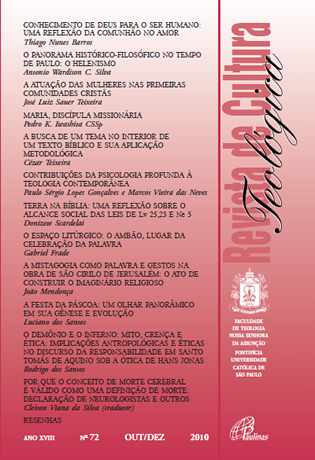Terra na Bíblia: uma reflexão sobre o alcance social das leis de Lv 25,23 e Ne 5
DOI:
https://doi.org/10.19176/rct.v0i72.15378Keywords:
post-exilic Judaism, Torah, Law of Moses, Judaism of the Second Temple, Jubilee YearAbstract
From brief semantic considerations, this essay seeks to assess the Mosaic Law on Earth, with special emphasis on the social issues associated with the field. Being a gift from Yahweh to the Israelites, the Earth embodies an ideal of inalienable property, whose right of ownership belongs to God alone. Israel becomes a tenant committed to the practice of law for social justice. By making tough criticism to deviations caused by political and social structure of the monarchy, the biblical writers want to draw attention to the experiences that prompted the early communal life, denouncing the monarchical model of conceiving the earth. The plantation is thus paying the Mosaic laws because of the concentration of the main source of livelihood in the hands of a few. The criticism on this project monarchy is portrayed in the Vineyard of Naboth (1 Kings 21), while an alternative solution emerges in the reforms of Ne 5.1-19. Outside the palace, Lv 25 refers to the celebration of the Jubilee Year peasant feast that brings to mind the peasant origins of Israel. The life and peasant villages conceived the earth as a source of livelihood of the clans. At the core of these tensions experienced between the peasant village and the royal palace was a social project to overcome individualism and promote cooperation in the community environment.How to Cite
Scardelai, D. (2013). Terra na Bíblia: uma reflexão sobre o alcance social das leis de Lv 25,23 e Ne 5. Revista De Cultura Teológica, (72), 111–133. https://doi.org/10.19176/rct.v0i72.15378
Issue
Section
Artigos


